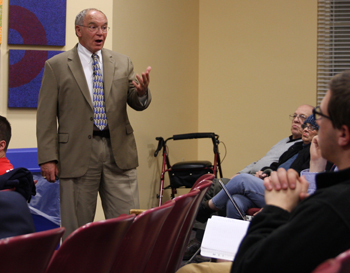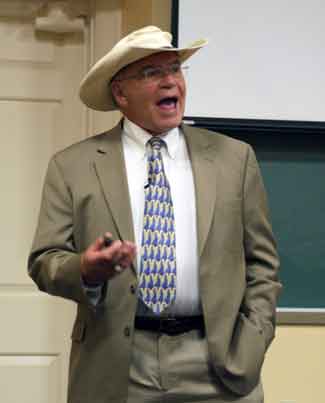The Wabash College Economics Department hosted its annual Rogge Memorial Lecture Tuesday, March 19th. The Rogge Lecture Series was started shortly after the death of Wabash professor Benjamin A. Rogge. Rogge, a stalwart in the Wabash faculty for decades, was a champion of libertarian principles and a free market approach to the economy.
Giving Tuesday’s lecture was Dr. Terry Anderson of The Property and Environmental Research Center. Dr. Anderson, who also a senior fellow at the Hoover Institution at Stanford University, works with the concept of ‘free market environmentalism.’
 To begin his lecture, entitled ‘Free Market Environmentalism: Breaking the Shackles of Regulation,’ Anderson presented a problem for the audience to ponder. He explained that in recent years wolves had been reintroduced into the natural ecosystem of Yellowstone National Park. Since their introduction, the wolves have become an integral part of Yellowstone as they help to keep other population in check while serving as a draw for tourists as well. When they were introduced, however, the wolves were a highly controversial issue. Anderson presented the viewpoints of the various stake holders in the wolf debate (wearing their respective hats for good measure) and explained that this debate is just one in which environmentalism is derived from a political source.
To begin his lecture, entitled ‘Free Market Environmentalism: Breaking the Shackles of Regulation,’ Anderson presented a problem for the audience to ponder. He explained that in recent years wolves had been reintroduced into the natural ecosystem of Yellowstone National Park. Since their introduction, the wolves have become an integral part of Yellowstone as they help to keep other population in check while serving as a draw for tourists as well. When they were introduced, however, the wolves were a highly controversial issue. Anderson presented the viewpoints of the various stake holders in the wolf debate (wearing their respective hats for good measure) and explained that this debate is just one in which environmentalism is derived from a political source.
“There was a battle over should we have any wolves and now should we have more wolves,” Anderson said. “The reason we have this can be thought of in the context of how we’ve done this. I like to put it under the headline of political environmentalism. When you have political environmentalism you have winners and you have losers. You have a zero-sum game … we end up with this incredible battle ground that tears at the social fabric.”
Anderson went on to explain that is just one of numerous examples of how political environmentalism has corrupted the cause of environmentalism. One of these examples were the political attempts to solve problems with over-fishing. In the late twentieth century, scientists began to realize that wild fish populations were being depleted at an exponential rate. In order to combat this, governments tried instituting laws which limited the number of days that fishermen could fish, the size their boats could be and even the types of nets they could use. Despite all of these regulations, over fishing still was increasing at a significant rate. According to Anderson, this is where political environmentalism fails and free market environmentalism can succeed.
 Free market environmentalism is exactly what it says it is; it is a capitalistic approach to a environmentalism. Effectively free market environmentalism tries to motivate people to protect environmental causes y using the profit incentive and not through legal means. Using the overfishing example again, a way that free market has tried to help fix this problem is by giving fishermen property rights to parts of their fishing grounds. In doing this, fishermen can catch fish within their given property and the fish population is protected because fishermen can only utilize their own property. This is just one example of how a free market approach to environmentalism could possibly help to further the cause of environmentalism. Although it hasn’t been widely used thus far in the environmental movement, Anderson feels that this could be an answer to this long term problem. But whether free market environmentalism is the answer we turn to in order solve our environmental woes or not, Anderson still agrees that something must be done to help and solve these problems.
Free market environmentalism is exactly what it says it is; it is a capitalistic approach to a environmentalism. Effectively free market environmentalism tries to motivate people to protect environmental causes y using the profit incentive and not through legal means. Using the overfishing example again, a way that free market has tried to help fix this problem is by giving fishermen property rights to parts of their fishing grounds. In doing this, fishermen can catch fish within their given property and the fish population is protected because fishermen can only utilize their own property. This is just one example of how a free market approach to environmentalism could possibly help to further the cause of environmentalism. Although it hasn’t been widely used thus far in the environmental movement, Anderson feels that this could be an answer to this long term problem. But whether free market environmentalism is the answer we turn to in order solve our environmental woes or not, Anderson still agrees that something must be done to help and solve these problems.
“With every mouth comes two hands and a mind,” Anderson said. “If we can unleash the two hands and the mind and the productivity, the ingenuity and put them toward solving environmental problems in cooperative kinds of ways, I think we will go a long way toward reconciling our differences.”